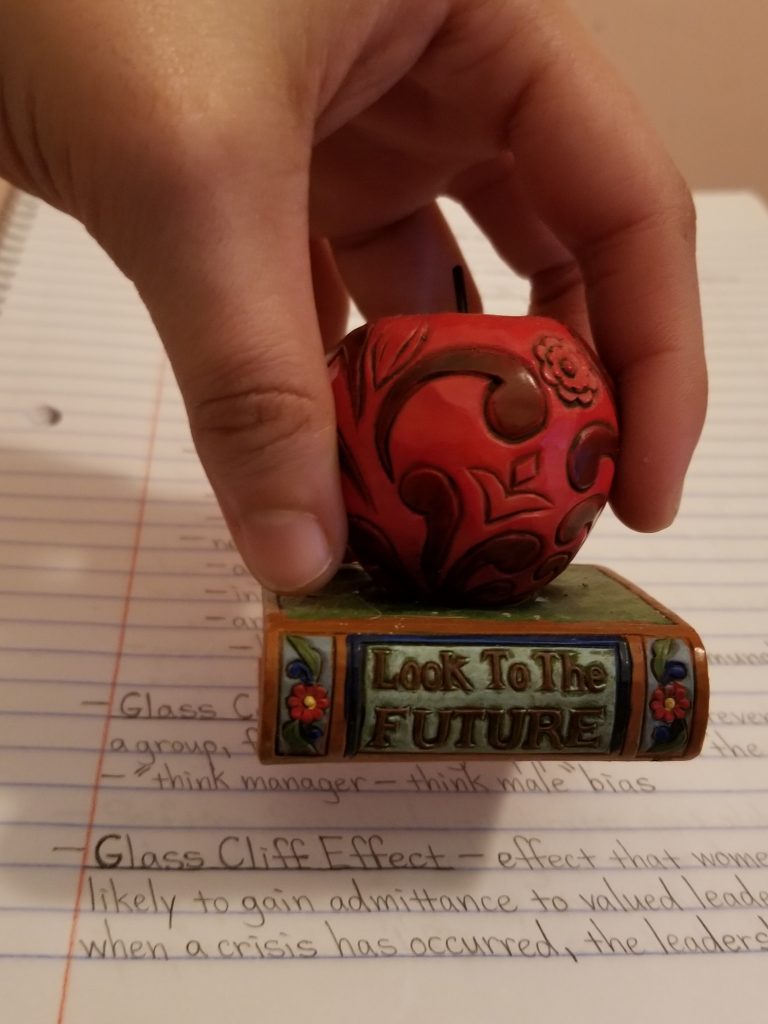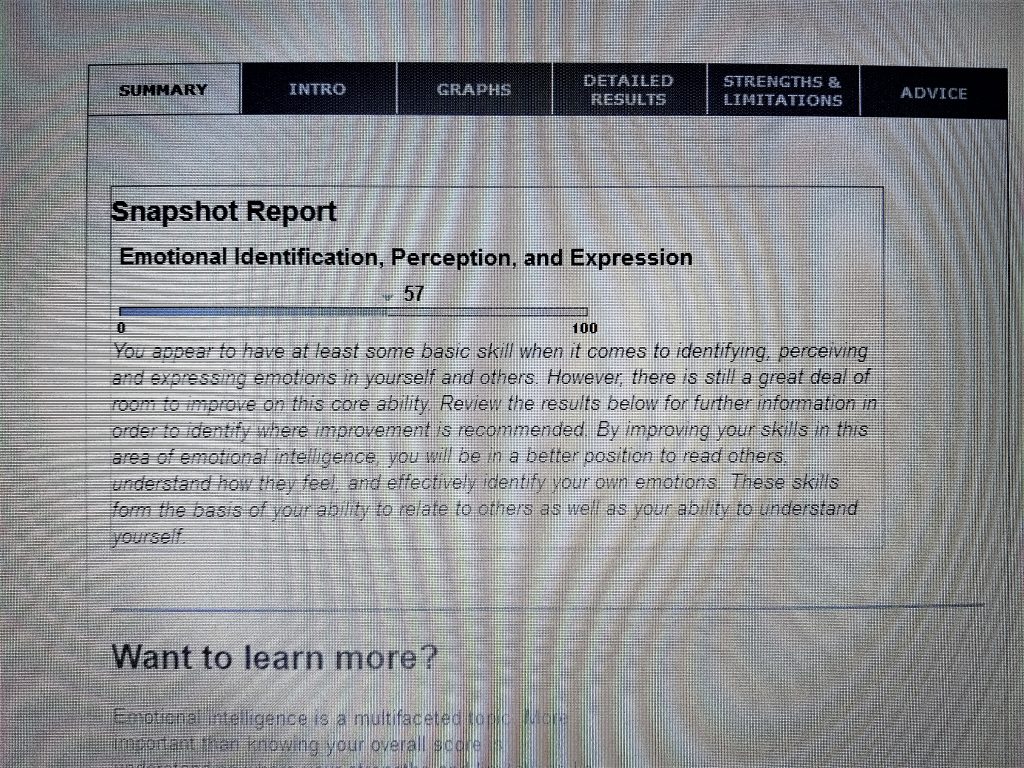
The Future Overshadowing Outdated Ideals
After reading over my very first “Blog 1” post, I feel a tad bit embarrassed. My initial expectations of the course were mostly in-line with the outcomes; we were to review everything outlined in the syllabus and thus far we have. The actual subject matter of the course was everything that I had expected, I just expected my own personal outcomes to be much better.
Over the last few months, I have grown more academically than I anticipated. One of the things that did surprise me was the sheer volume of various terminologies used in Social Psychology and some that were slightly similar to one another but with a caveat or two. Though I understood the general concepts and ideas quite well, it seemed I had some difficulty pegging down the individual terms and it’s made me grow academically to realize those mistakes and revert back to correct them. The academic growth was not only in the class itself, (which, of course contributed to academic growth) but was in recognizing the mistakes I’ve made in not focusing enough on the terms, the details, and through these last few chapters attempting to correct those flaws. Those realizations will be carried with me through the rest of my academic career.
My attitudes about Social Psychology have not changed throughout the course. Social Psychology has been my favorite class this semester, and I always looked forward to reading the next chapter and pondering its relevance in my life and the lives of those around me (which, being Social Psychology, was always relevant!).
I feel after reviewing the course objectives in the syllabus that they were achieved, but I could have done better on the individual terminologies. Again, I feel as if I’ve got a firm grasp on the concepts as a whole, it’s the details that have occasionally eluded me and if I was to take this class again, I would make flashcards or review those terms and definitions a lot more closely. Not only would I get the definitions and terms down much better, but I would think more critically about them while I reviewed them; the test questions were asking us as students to take those terms we had learned and actively apply them to hypothetical situations and scenarios. I can’t say I’ve had many tests like that, and it was definitely a challenge, but overall, it was one I enjoyed because it made us not just know the terminology but required us to apply it accurately to hypothetical scenarios.
After everything I’ve learned in this course, I can say with absolute certainty that the skills and knowledge gained throughout this semester in Social Psychology can be applied to every aspect of my life: from personal, to social, to relationships, and of course professionally. There is one aspect of Social Psychology that has already helped me in my “professional” life, and I believe it will continue to contribute to future successes. I would not consider my current job a “long-time profession”, but it is how I acquire income at the present time and will continue to do so until graduation. Now, back in February, the owner of the store location I manage had asked me if I wanted to take over on Sundays and I said I would think about it, feeling a bit overwhelmed at the schoolwork load; they gave me until March 1st to officially decide.
On February 28th, I was feeling a lot better about school work after midterms and Spring Break was just about to begin, giving me even more time to sort my schedule out and I let the owner know that day that I officially wanted to start on Sundays as well. The co-owner actually got back to me first and stated that they had given the Sunday away to a distant coworker that had been employed at another location. I sat back and thought about my initial reaction, how I internally accepted it and took it as a loss; but we had just gone over chapter six (The Causes, Effects, & Cures of Stereotyping, Prejudice, and Discrimination) not too long ago and I was reading through chapter eight (Social Influence) early, and I was questioning my immediate reaction; and I put my foot down. I called the co-owner right then and stated my case: that I had until March 1st to decide (I was a day early), I was a good, dependable individual to run the location, and I deserved to have the day given to me. I was thinking about chapter six and how I wasn’t going to be pushed aside for “promotion” (in a way), chapter eight and how I didn’t want to fall into conforming to the social norms I had always done in prior jobs even though I didn’t want to, and how during that week’s chapter I also happened to listen to a Freakonomics Radio podcast episode about the glass ceiling/glass cliff effect and how women don’t “speak up” in order to “avoid conflict”.
I got the day, as well as an 11% raise.
Realizing all of what I have learned those past few weeks and having those lessons culminate together have helped me already in a small way at a temporary (in terms of a life/career) job, and now that I’ve gotten a small taste of speaking up for myself, I know without a doubt that the lessons and skills I’ve learned here will continue to help me in my future career and professional life.
Blog 9
For me, the top things that I learned about so far in terms of sheer interest were the influence of advertisements in our society, the “growth” that has occurred overtime with the photo assignment, and the different cognitive shortcuts, or heuristics we tend to use every single day when we cannot give something our full cognitive attention.
The influence of advertisements blog entry definitely “spilled over” into the heuristics assignment because, as we learned, advertisements don’t necessarily rely on our full cognitive attention to “implant” their messages within us to get us to consume some good or service. Instead, they can create cognitive shortcuts (heuristics).
The photo assignment basically spilled over into the blog entry about emotional intelligence, as that could have a lot to do with self-control and self-preservation.
Finally, the heuristics assignment has been a constant reminder throughout the entire semester and has been utilized by me as a student to attempt to create cognitive shortcuts with key words and key terms.
I’ve learned a lot of from this class so far, and a lot has built on knowledge from previous psychology and sociology classes. One of the biggest things that I’m sure every psychology student knows by now is the Milgram experiment and Stanford Prison experiment, both of which were reviewed again on the chapter with conformity and obedience.
BLOG 8:
After reading the article, from an evolutionary standpoint, it makes a lot of sense. The focus of the article was sexual conflict and the “stages of sexual conflict in the mating process”, in which the article discusses the ways in which men try to achieve their evolutionary goals as well as how women attempt to achieve their evolutionary goals.
The thing about each goal though, is that it seemed to have a negative and upsetting reaction towards the mate being approached. For instance, the article stated the majority of men admit to faking emotional interest in order to achieve the goal of consummation, whereas women send signals of sexual interest in order to achieve their goals of security; these actions create the “sexual conflict”.
If one mate is doing one thing when they really want to do another, as is the other, one can see why this would be quite upsetting for both mates to never really “be on the same page” if they’re both just doing what is expected of them.
I think in the modern context, this can be what causes such as conflict between “men not understanding women” and “women not understanding men”. The ways in which men upset women seem to be playing on those evolutionary characteristics, that women have historically looked for security and investment. While the ways in which women upset men are also playing on those evolutionary characteristics; that men have historically looked for mates to have sex with.
From a strictly evolutionary perspective, again, this makes sense. However, I do not believe the reasons for the ways the sexes upset each other are as basic as they were 200 thousand years ago. I do believe the actions of playing on those same evolutionary traits are present, but not in the same basic ways; as societies continue to evolve and humans ourselves continue to evolve, the way in which the mating ritual will also continue to evolve.
Photo References:
http://www.lifestylegod.com/women-are-furious-that-men-are-paying-to-learn-how-to-get-them
http://www.kkrv.com/science-proves-women-hold-grudges-stay-angry-longer-men/


BLOG 7:

This is probably the most difficult blog entries for myself thus far; simply because I watched the video (three times), I understand what Dr. Ferguson was saying, particularly in reference to the breathing exercises, but I don’t really understand how individuals can self-regulate their emotions on cue, especially if they’ve reached a certain threshold. This subject to me is like that old philosophical question; of the robot (or blind doctor, however one has read it) that knows everything scientifically there is to know about color, the measures of wavelengths, etc., but the question is, because they can only see in black and white, can it/they actually experience color?
I understand that self-regulation is something that you can learn in order to improve your emotional intelligence. I also understand that they essentially work together; you have to have the emotional intelligence to understand, perceive, and sort your emotions before you can begin to self-regulate them, and you also have to have self-regulation in order to build upon your emotional intelligence; their relationship is intertwined.
I’m not naïve enough to believe my emotional intelligence is nonexistent; I would even go so far as to say that I can read other people very effectively, and I can always tell when “something is wrong” among those I am close with and in fairly frequent contact. Even individuals in the establishment I work at, if I recognize them, I can often tell what kind of mood they’re in based on facial expression, gait, and even their voice can give away how they’re feeling or what kind of mood they are in (example: “lumberjack beard guy” is never up for small talk). However, emotional intelligence means more than that to me; it means also being able to sort through my own emotions and understand them, which is not something I am able to do, at least not very well. I am usually in a state of content; I look forward to the future, and I am not often sad. But if I do feel negative emotions creeping up, I tend to disassociate with them and distract myself with activities I enjoy. If I’m not able to dismiss them, they often turn to rage and the “fight or flight” Dr. Ferguson mentioned is activated and it does happen most often and intensely while driving. Due to these “black or white” states, either content or extreme emotion, there never seems to be any sort of “middle ground”. Effective emotional intelligence to me would be understanding that middle ground.
As stated earlier, I display my emotional intelligence most effectively while tuning into the emotions of others; as to how I could improve the other aspects of EQ, namely, understanding and regulating my own emotions, if I knew that, my life would look very different by now! The breathing exercises can sometimes be effective, but I never know if what I’m ever feeling, especially if it is in the apex of intensity, is “called for” or a “rational” reaction, so I disassociate and bring myself back to a state of content or indifference. If I understood how to, I would improve my EQ by not doing that and working through whatever emotion it is I’m going through.
BLOG 6:

After watching Jean Kilbourne’s Still Killing Us Softly, I was absolutely taken back. I have previously been (somewhat) informed of the objectification that takes place in advertising; last semester we had to watch a TED talks about it that was very enlightening with the main focus on women’s objectification, and I often watch/listen to documentaries in the background while copying notes and I recently saw an episode of Reggie Yates: Outside Man on Netflix, in which Yates explores the trend of men’s self esteem drops in Britain due to advertising. The influence of advertising causes the young men he meets in Britain to bulk up at the gyms, often accompanied with steroid use and an increase in heart problems, heart attacks, and deaths in young men to meet the “buff/hulk ideal man”.
However, the video that we watched was made in 1987 and although it seems some of the more grotesque objectifications were left behind, it is apparent that some aspects of that era are still utilized today. My strongest reactions to the video, in which my red was raised so high that it actually triggered a migraine, were the advertisements that used little girls and women as corpses. The one with the little girl that looked about five years old, same age as my little cousin, shirtless and in a very suggestive position got me incredibly angry; I did not understand how something like that was even legal as suggestive as it was. The others in which women were portrayed as being beaten, stomped on, or even murdered was also incredibly shocking.
Prior to this video, I had noticed how ads distort, stereotype, and dehumanize women; but I must say I had not seen it on the level that was present in the video. I think most of us are familiar with the most overtly sexual ads utilized today, a common one being the Hardees and Carl’s Jr. advertisements, but after a Google search to find more “modern” ads, it’s apparent there’s much more sexualized ads out there and it seems the most sexualized images are present in magazines (I don’t read magazines, so most were a definite shock).
References:
http://phosmer.squarespace.com/blog/2009/7/23/nobody-really-wants-to-fuck-a-robot.html
Heineken Robot Advertisement
BLOG 5:



We all like to think we’re not affected by advertisements, but the fact is that we are. When it comes to the credible source, Beats by Dr. Dre, we know that Dr. Dre is a famous musician. The fact that he’s made his own headphones gives his product a great deal of credibility as he is an expert in music and beats. Those that identify with Dre and his music also trust that he’s made a good product.
The Galaxy Note 8 advertisement is not credible, though it is attractive in an advertisement sort of way. It creates the illusion that you can do so much more with the S-Pen that is included with the phone; but the reality is that it cannot do what the advertisement is portraying or exaggerating and therefore is not credible.
The Jimmy Choo Man cologne advertisement is and attractive advertisement, but we all know by now that perfumes and colognes follow the same attractive, sensual, sexual formula for advertising and therefore it feels so much less credible because of it. The attractiveness of the advertisements suffer just because we already know exactly what to expect from these types of ads.
References:
https://i.pinimg.com/originals/29/25/14/2925145e3ab4089e2969489d376d5145.jpg
Beats by Dr. Dre – Credible
https://www1-lw.xda-cdn.com/files/2017/08/In-Depth-Note8-S-Pen_main_1-e1503502507130-810x298_c.jpg
Galaxy Note 8 – Not Credible
Cologne – Attractive
BLOG 4:
After reviewing my test and the questions I got incorrect, I learned that the majority of the questions I had missed were due to mixing up concepts; I had an especially difficult time (for some reason) distinguishing between “intergroup” and “intragroup” and remembering which was which due to the words being so similar. Prior to the test, I had taken detailed notes as I went through the chapters; it was a matter of separating concepts that were somewhat similar, like the actor-observer effect and self-serving bias. I had also gone over the review sheet prior to the test, but I like to study large amounts of information until the point where I know I’m no longer retaining the information, and then continuously reinforce that information over the week prior to the test. It’s not really “cramming” as it is spaced out over time, but smaller chunks may be more manageable in the future if I can learn to control my tendency to “hyper focus”.
I think looking over the test and seeing exactly where I went wrong will help my test-taking strategy in the future by attempting to space out more of the studying and reinforcing the differences between theories and concepts that are somewhat similar.

BLOG 3:
I believe, even before reading the article “Soul Meets Body, that music can and does play a role in relationships; those that are already established as a “reference” or “nostalgia” and new relationships to use as a comparative tool of taste, values, and outlook. A great deal can be learned of a new acquaintance, friend, or partner, based on the content they choose to listen and refer to. I’m sure, like myself, a lot of people have various styles and genres of music they listen to based on situation and mood; which may not be completely reflective of their values or personalities within a general context (just as we recently learned how our “true selves” are changing and evolving and can be influenced by situation, cognition, and/or affect).
I have noticed a similarity between my own music preferences and those of my friends and acquaintances. I can say with confidence that those that are within my closest/innermost social network all listen to similar music that I do, and I believe that’s indicative of the relevance that music plays in identifying those that have similar values and ideals.
My Soundtrack:
Life Outlook – Changes (Tupac)
Friend Katie – Look At Me Now (Lil Wayne, Busta Rhymes, Chris Brown)
Friend Marqo – No Diggity (Blackstreet)
Friend Mark – The Wanderer (Dion)
Friend Cody – Indestructible (Disturbed)
Me – DNA. (Kendrick Lamar)
“We gotta start making changes,
Learn to see me as a brother instead of two distant strangers
…
That’s just the way it is,
Things’ll never be the same
That’s just the way it is”
-Tupac Shakur

Photo Credit: http://www.dailymotion.com/video/x23tgel
BLOG 2:

Survey Response
As a student, I believe I try to the very best of my ability, not only to do all of the assigned materials, but to retain all of the information in any given class. To me, it’s not just about “passing” or “getting by”, but I want to actually master the classes I take and retain all of the information learned over a semester for the long-term.
I feel really confident as a student. Although this semester has been quite difficult in terms of finding extra time to go through chapters and notes for fun, I still feel like I am doing everything I can to learn the material; and not just learn but understand and comprehend.
The biggest thing that increases my confidence as a student are good grades. I love to look and see the grades updated and see I did well, and it’s even better if a professor is able to comment on what was right or what was wrong because it helps me understand how I could do even better next time.
BLOG 1:

After reviewing the course syllabus once again, I have no doubts that this class will help me in getting more informed and educated in both the realms of psychology and sociology. Going through the experimental procedures used to test hypothesis will equip me to think more quantitatively, and well as qualitatively. Discussing the various processes we go through to perceive and understand others will allow me to understand my own unconscious thought processes. Learning the development of attitudes and how they relate to behavior will help me understand myself, as well as others around me. Already knowing the effects of prejudice and discrimination from personal experience, I am looking forward to discussing the actual origins of this social phenomenon. Finally, discussing what leads to us liking the presence of certain individuals, and how we build close relationship with them will help in everyday life; as we socially interact with others nearly every day.
I expect by the end of this course to be highly informed in all the topics covered in the syllabus. I want to understand, as in-depth as a semester will allow, how other people and groups affect the behavior of an individual. I am hoping to gain better insight into the social aspect of psychology.
To ensure the highest probability of success in this course, I plan to do all of the assignments, all of the readings assigned, and take a personal responsibility to thoroughly understand the material by reading it, reviewing it, and taking detailed notes. If I don’t understand a concept, I plan to ask questions, so I have everything straightened out.
http://sites.psu.edu/pagegreen/wp-content/uploads/sites/38853/2016/02/38171672.jpg Stereotyping Meme